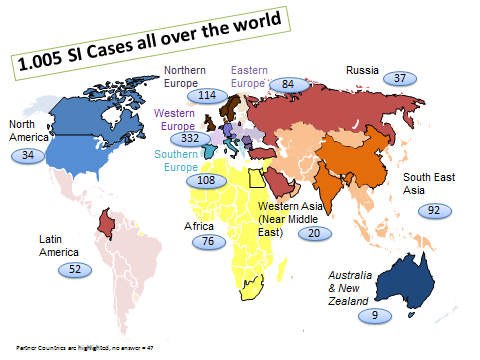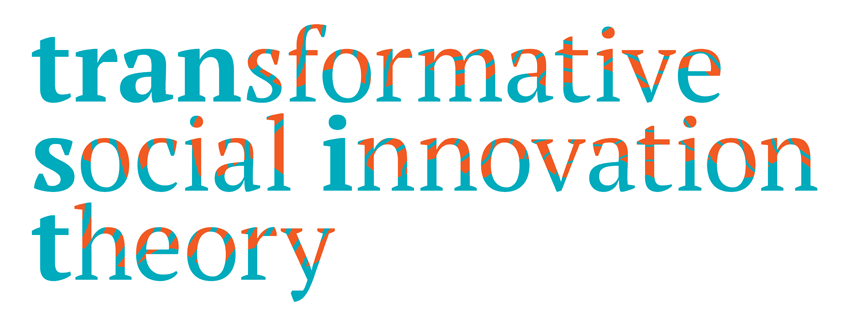|
|
| |
Welcome to the SI-Drive Newsletter
Eleventh edition
|
|
|
| |
Welcome to the eleventh eNewsletter of SI-DRIVE, a large-scale research project funded in the European Union’s 7th Framework Programme (FP 7). In our eleventh edition we focus amongst others on the 'Comparative Analysis' of the mapping results.
|
|
About SI-DRIVE
|
|
|
| |
First Comparative Analysis on the Worldwide Mapping of Social Innovations
Now Available
|
|
|
| |
The Comparative Analysis is based on empirical data of more than 1.000 social innovation cases. It delivers new insights into the diversity of social innovation approaches in different parts of the world used by practitioners, researchers and policy makers. It also provides an overview of various types of social innovations in seven policy areas (education, employment, environment and climate change, energy supply, transport and mobility, health and social care, and poverty reduction and sustainable development). [Read more]
|
|

|
|
|
| |
SI-DRIVE meets SIC
Breakout Session on Social Innovation Research
|
|
|
| |
On 2nd September 2016, a breakout session on social innovation research took place in Dortmund during the Meeting of the SI-DRIVE Steering Committee. It was organised in the context of the project Social Innovation Community (SIC) which aims at creating a ‘network of networks’ of social innovation actors. SIC identifies, engages and connects actors including researchers, social innovators, citizens, policy-makers, as well as intermediaries, businesses, civil society organisations and public sector employees. [Read more]
|
|


|
|
|
| |
Partner project SIC has launched its new website
SIC Website online
|
|
|
| |
Social Innovation Community (SIC), a partner project of SI-DRIVE has launched its new website: http://www.siceurope.eu
It will help you to stay connected with everything that is happening in the field of social innovation in Europe. You will also find lots of ways to get involved in SIC activities and community. [Read more]
|
|

|
|
|
| |
Second Call for Papers of the EPSIR Review
Social Innovation in the Public Sector: Theory and Practice
|
|
|
| |
This call for papers aims to address the challenges and new implications of social innovation influencing the creation of public and social policies. Social innovation theory and practice has become an important topic, which has influenced the way in which science and society conceive and think about the design and use of social policies inside the public sector.
Contributions should focus on the relation of social innovation with public and social policy. This relationship can be approached through different perspectives. [ Read more] |
|
 |
|
|
| |
And more Publications on Social Innovation...
...Dealing with social innovation networks and Cooperative Platforms
|
|
|
| |
The researchers of the TRANSIT project – a EU-cofinanced research project that will develop a theory of transformative social innovation which is about empowerment and change in society – completed their second batch of case studies of eight transnational social innovation networks. This brings the total number of studied networks to 20, including 40 local manifestations spread across Europe and Latin America. The analysis resulted in a 300-page report which is available here.
LAMA Agency, in collaboration with Cooperatives Europe, carried out an exploratory study on the challenges and opportunities of applying the collaborative economy to cooperative companies. The analysis of the study comprises the potential benefits of a convergence between cooperatives and the collaborative economy. The emerging role of platform cooperatives is of particular interest since they bring together the most successful elements of the “cooperative model” (such as collective ownership, democratic governance, etc.) with the increasingly evident potential of digital innovation and digital platforms. The paper is available here.
|
|



|
|
|
| |
Events focusing on Social Innovation and SI-DRIVE...
...in Europe and Asia
|
|
|
| |
From 18th to 23rd July 2016, a Summer School on "Entrepreneurship & Innovation" was held in Hangzhou, China where two SI-DRIVE partners participated in giving lectures and presentations. The Netherlands Organisation for applied scientific research (TNO) presented SI-DRIVE and studies on social innovation and workplace innovation, while Zhejiang University (ZJU) presented studies on social innovation and social quality. [Read more]
At the European Conference on Educational Research ECER 2016 in Dublin, Antonius Schröder from TU Dortmund University (TUDO) presented the results of the global mapping of SI-DRIVE in relation to the Policy Field "Education and Lifelong Learning". The main objective of the presentation on 24th August 2016 was to discuss the social innovation concept in the educational policy environment, to find out what and who drives social innovation in the field of education, which stakeholders are doing what and how far educational policies can be barriers or facilitators to innovation. [Read more]
The global mapping of SI-DRIVE was also the main topic of Dmitri Domanski's (TUDO) presentation at the conference “Social Innovation Training in Higher Education”, which took place in Dublin from 31st August to 1st September 2016. [Read more]
Contributions to a more inclusive society in general, and the involvement of people with activity limitations in particular play a considerable role for social innovation initiatives. Amongst others, this central result of the analysis of the global mapping of SI-DRIVE was presented by Jennifer Eckhard (TUDO) at the conference "ISIRC 2016 - Social Innovation in the 21st Century: Beyond welfare capitalism?" in Glasgow on 5th to 7th September 2016. [Read more]
The congress "Innovation for Society – New Ways and Methods to unfold the Potential of Social Innovation" on 20th and 21st September in Berlin was hosted by TU Dortmund University in cooperation with the Institut für Technikfolgenabschätzung und Systemanalyse (ITAS). [Read more]
|
|
Event review
|
|
|
| |
European Meeting on Urban Social Innovation
Cooperation of the Three Projects SIC, SIMPACT and SI-DRIVE
|
|
|
| |
The meeting is organised by SI-DRIVE partner Sinnergiak Social Innovation (UPV/EHU), The National Institute of Public Administration (INAP) and the Rey Juan Carlos I University in close collaboration with three European Projects SIC, SIMPACT and SI-DRIVE. Amongst others, inputs and discussion will concern principles and actors of urban social innovation, needed resources, infrastructures and networks, and measuring approaches. More details can be found here.
|
|
From 6th to 7th October 2016 in Donostia-San Sebastian/Spain
|
|
|
| |
CominG Soon...
twelfth SI-DRIVE Newsletter
|
|
|
| |
The twelfth SI-DRIVE newsletter will be issued in December 2016. Please register at our si-drive website if you are willing to receive regular information. |
|
12th SI-DRIVE Newsletter
|
|
|
|
|
|
|
|
|
|
|

|
This project has received funding from the European Union’s Seventh Framework Programme for research, technological development and demonstration under grant agreement no 612870. |
|
|